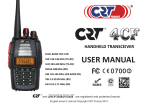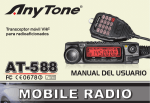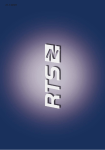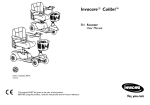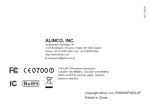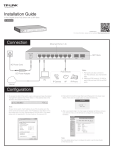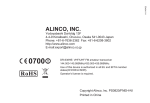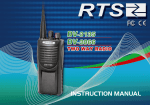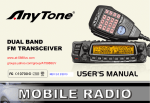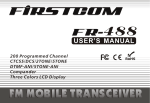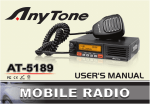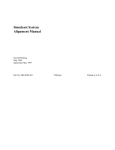Download AT-3208UV click here
Transcript
A1.140625 AT-3208UVII DUAL BAND HANDHELD RADIO INSTRUCTION MANUAL THANK YOU! transceiver will provide you with reliable, clear and efficient communication service. The transceiver introduces innovative DSP digital signal processing technology, high degree integration, it is including kinds of professional function, best stability and great reliability as well as exterior smooth lines, novel, fashionable, sturdy and durable. The transceiver is including plenty of TX, RX channels, as well as UU, VV and UV standby modes which is able to realize cross band function, 51 groups of CTCSS encode/decode and 1 group of user-defined CTCSS encode/decode, 1024 groups of DCS encode/decode, 5TONE encode/decode, DTMF encode/ decode, built-in FM radio functions, etc.. It is a meticulous build functional and Multi frequency band radio for radio amateur. MODELS APPLY TO THIS MANUAL AT-3208UVII FM Transceiver Programming software: QPS3208UV_1.01 PROGRAM CAUTIONS When programming the transceiver, read the factory initial data first, then rewrite the frequency and signaling etc., other wise errors may occur because of different frequency band etc. CAUTIONS transceiver is excellent designed with advanced technology. The following tips will be helpful for you in performing your obligation under warranty and understanding the safety of transceiver usage. 1.Keep the transceiver and accessories away from children. 2.Please do not try to open or modify the transceiver without permission, non-professionals operation may also cause damage. 3.Please use assorted battery and charger to avoid damage. 4.Please use assorted antenna to ensure the communication distance. 5.Please avoid exposing the radio under the sunshine for a long time or storing it in too hot places. High temperature will shorten the life of electronic devices. 6.Please avoid storing the radio in the dusty, dirty and damp areas. 7.Please keep the radio dry. Do not wash radio with ardent chemicals and detergents. 8.Do not transmit without antenna. 9.When using this transceiver, we recommend transmitting for 1 minute then receiving for 4 minutes. continuously transmitting for long time or working in high power will heat the back of the transceiver. Do not place the transceiver's hot back close to any plastics. 10.If any abnormal smell or smoke coming from the transceiver, please turn off the power instantly and take off the battery dealers. and its case. Then contact local NOTE: transceivers' accessories. If any device can not operate All the above tips apply for your normally, please contact with local dealers. If you use any accessories made by other companies, company does not guarantee the operability and safety of the transceiver. TABLE OF CONTENTS UNPACKING������������������������������������������������������������������������������������������������������������������������������������������������������������������������������������������������ 01 Supplied Accessories ������������������������������������������������������������������������������������������������������������������������������������������������������������������������� 01 STANDARD ACCESSORIES/ADDITIONAL ACCESSORIES������������������������������������������������������������������������������� 02 Standard Accessories�������������������������������������������������������������������������������������������������������������������������������������������������������������������������� 02 Additional Accessories������������������������������������������������������������������������������������������������������������������������������������������������������������������������ 02 BATTERY INFORMATION����������������������������������������������������������������������������������������������������������������������������������������������������������������� 03 Charging Operation������������������������������������������������������������������������������������������������������������������������������������������������������������������������������ 03 Battery Charger Type�������������������������������������������������������������������������������������������������������������������������������������������������������������������������� 03 Notice for Charging Battery�������������������������������������������������������������������������������������������������������������������������������������������������������������� 03 How to Charge���������������������������������������������������������������������������������������������������������������������������������������������������������������������������������������� 04 Charging Prompt������������������������������������������������������������������������������������������������������������������������������������������������������������������������������������ 06 How to Store the Battery�������������������������������������������������������������������������������������������������������������������������������������������������������������������� 06 GETTING ACQUAINTED������������������������������������������������������������������������������������������������������������������������������������������������������������������� 07 LCD Display��������������������������������������������������������������������������������������������������������������������������������������������������������������������������������������������� 07 BASIC OPERATIONS��������������������������������������������������������������������������������������������������������������������������������������������������������������������������� 10 Turn the Radio On & OFF����������������������������������������������������������������������������������������������������������������������������������������������������������������� 10 Adjusting Volume����������������������������������������������������������������������������������������������������������������������������������������������������������������������������������� 10 Switch between Main band and Sub band������������������������������������������������������������������������������������������������������������������������������� 11 Switch between Channel mode and VFO mode�������������������������������������������������������������������������������������������������������������������� 11 Channel Adjusting��������������������������������������������������������������������������������������������������������������������������������������������������������������������������������� 11 Frequency Adjusting����������������������������������������������������������������������������������������������������������������������������������������������������������������������������� 11 Frequency Input by Keypad������������������������������������������������������������������������������������������������������������������������������������������������������������� 12 Channel Input by Keypad������������������������������������������������������������������������������������������������������������������������������������������������������������������ 12 FM Channel Searching����������������������������������������������������������������������������������������������������������������������������������������������������������������������� 13 Squelch Off Momentary / Squelch Off����������������������������������������������������������������������������������������������������������������������������������������� 13 I TABLE OF CONTENTS Receiving��������������������������������������������������������������������������������������������������������������������������������������������������������������������������������������������������� 13 Transmitting���������������������������������������������������������������������������������������������������������������������������������������������������������������������������������������������� 13 Emergency Alarm���������������������������������������������������������������������������������������������������������������������������������������������������������������������������������� 14 Side Key [PF1] function instruction����������������������������������������������������������������������������������������������������������������������������������������������� 14 Side key [PF2] function instruction����������������������������������������������������������������������������������������������������������������������������������������������� 15 Edit channel���������������������������������������������������������������������������������������������������������������������������������������������������������������������������������������������� 15 Delete channel���������������������������������������������������������������������������������������������������������������������������������������������������������������������������������������� 15 Programming scan�������������������������������������������������������������������������������������������������������������������������������������������������������������������������������� 16 Turn On/Off FM Radio������������������������������������������������������������������������������������������������������������������������������������������������������������������������� 17 CTCSS/DCS Setup������������������������������������������������������������������������������������������������������������������������������������������������������������������������������ 17 CTCSS/DCS Scan�������������������������������������������������������������������������������������������������������������������������������������������������������������������������������� 17 Offset Frequency Direction Setup������������������������������������������������������������������������������������������������������������������������������������������������� 18 Frequency/Channel Scan������������������������������������������������������������������������������������������������������������������������������������������������������������������ 19 Channel Scan Skip������������������������������������������������������������������������������������������������������������������������������������������������������������������������������� 19 Frequency Reverse������������������������������������������������������������������������������������������������������������������������������������������������������������������������������ 20 TX Power selection������������������������������������������������������������������������������������������������������������������������������������������������������������������������������� 20 Stopwatch function������������������������������������������������������������������������������������������������������������������������������������������������������������������������������� 20 DTMF code Transmit and Enquiry������������������������������������������������������������������������������������������������������������������������������������������������ 21 Keypad lock���������������������������������������������������������������������������������������������������������������������������������������������������������������������������������������������� 21 Single-band Switching������������������������������������������������������������������������������������������������������������������������������������������������������������������������� 22 Function Menu Setup�������������������������������������������������������������������������������������������������������������������������������������������������������������������������� 23 Display Mode Setup����������������������������������������������������������������������������������������������������������������������������������������������������������������������������� 28 Resume Factory Default�������������������������������������������������������������������������������������������������������������������������������������������������������������������� 28 TECHNICAL SPECIFICATION������������������������������������������������������������������������������������������������������������������������������������������������������� 30 TROUBLE SHOOTING GUIDE������������������������������������������������������������������������������������������������������������������������������������������������������ 31 II UNPACKING Please carefully unpack the transceiver. We recommend that you identify the items listed in the following table before discarding the packing material. If any items are missing or have been damaged during shipment, please contact with dealers immediately. Supplied Accessories Item Number Antenna QA11UV 1 Li-ion Battery QB-40L 1 Battery Charger QBC-40L 1 AC Adaptor QPS-07 1 Belt Clip BC09 1 Instruction Manual Quantity 1 01 STANDARD ACCESSORIES/ADDITIONAL ACCESSORIES Standard Accessories Antenna*1 QA11UV 155/435MHz Li-ion Battery QB-40L Battery Charger AC Adaptor QPS-07 QBC-40L Belt Clip BC09 Instruction Manual *1.Note: For frequency band of antenna, please refer to label indicated in the bottom of the antenna. Additional Accessories USB Programming Cable PC03 Programming Software Handheld Microphone QHM22 02 QPS3208UV_1.01 Earphone Telescopic antenna QA10UV HS03 Battery Pack for Car Charger CPS05 BATTERY INFORMATION Charging Operation The battery is not charged at the factory, please charge it before use. Charge the battery for the first time after purchase or extended storage (more than 2 months) may not bring the battery to its normal operating capacity. After repeating fully charge/discharge cycle for two or three times, the operating capacity will reach the best performance. The battery life is over when its operating time decreases even though it is fully and correctly charged. Replace the battery. Battery Charger Type Please use our company's designated charger, other models may cause explosion and injure people. After installing the battery, if the radio red light twinkles and remind changing battery, please charge the battery. Notice for Charging Battery ▲▲ Do not shortcircuit our company designated charger. Never attempt to remove the casing from the battery, we show no responsibility on the faulty caused by modifying freely without permission of our factory. ▲▲ The ambient temperature should be between 5℃ and 40℃ in charging. Charging outside this range may not fully charge the battery. ▲▲ Always switch off the transceiver equipped with a battery before charging. Otherwise, it will interfere with correct charging. ▲▲ To avoid interfering the charging procedure, please do not cut off the power or take out the battery during charging. 03 BATTERY INFORMATION ▲▲ Do not recharge the battery if it is already fully charged. This may shorten the life of the battery or damage the battery. ▲▲ Do not charge the battery or transceiver if it is damp. Dry it before charging to avoid danger. WARNING: When keys or ornamental chains and other electric metals contact with the battery terminals, the battery may cause damage or hurt bodies. If the battery terminal short circuit, it will generate a lot of heat, please be careful when you bring or use the battery, please put battery or radio into insulated container. Do not put it into metal container. How to Charge 1.Plug the AC adaptor into the AC outlet, then plug the cable of AC adaptor into the DC jack, the indicator lights orange for 1s and turns into GREEN---waits to charge. 2.Slide the battery or transceiver with battery into the charger; make sure the battery terminals are in contact with the charging terminals well. LED turns into twinkling RED---precharging begins. 3.Pre-charging for about 5 minutes, LED twinkles stop then charging begins. 4.It takes about 4 hours to fully charge the battery, when LED turns into GREEN — full charged. 04 BATTERY INFORMATION NOTE: When charging a power-on transceiver equipped with battery, the LED will not turn into green to show the full charge status. Only when turn off the transceiver, the LED can indicate normally. Because when the transceiver is power on, it would consumes energy, the charger cannot detect when battery has been fully charged, the charger will charge battery in voltage consumption and fail to indicate correctly. 5.Charging Process: Status Standby (self-examine orange lights 1second when power on) Pre-charging (pre-charging stage) Charging (charge in constant currency) Full charged (charge in constant voltage) LED Green light Red light twinkles for about 5 minutes RED light lightens for about 4 hours Green light 6.LED Indicator: self-examine Charge Full STATUS (No battery) Pre-charging Trouble when power on normally Charged Orange Red light twinkles Red twinkles LED Green Red Green (for 1 second) for 5 minutes for a long time NOTE: Trouble means battery heating, battery short-circuit or charger short-circuit. 05 BATTERY INFORMATION Charging Prompt 1.Self-examination: When charging, ORANGE light twinkles for 1 second and goes out. That means the charger has passed its self-examination and it can charge the battery normally. If the light remains orange or the red light twinkles, which means the charger can not pass its self-examination or charge the battery. 2.Trickle pre-charging: When the battery has been inserted into the charger and red light twinkles, which means the remnant voltage is low, the charger trickle charge the battery (pre-charging status), until the battery reaches a certain electric quantity, the charger automatically turns into normal charging. And if the red light stop twinkling, which means the remnant voltage meets a certain electric quantity, the charger will charge the battery normally. Note:The time for Trickle pre-charging is not exceed 30m. After 30m, the red indicator is still twinkling, it means it is unable to charge battery. Please kindly check battery and charger. How to Store the Battery 1.If the battery needs to be stored for a long period, the battery should be removed from the radio. It's state of charge should be 50-100% charged. 2.It should be kept in low temperature, dry environment. 3.To keep away from hot places and direct sunlight. 06 WARNING ▲Do not short circuit battery terminals. ▲Never attempt to remove the casing from the battery pack. ▲Never assemble the battery in dangerous surroundings, spark may cause explosion. ▲Do not put the battery in hot environment or throw it into fire, it may also cause explosion. GETTING ACQUAINTED LCD Display On LCD display screen, you will see various icons which stand for the selected functions and sometimes you may forget the meaning of them. Here you will find the following table extremely useful. Frequency Reverse Offset Frequency DCS Optional signaling CTCSS FUNC Icon The arrow points to main channel FM radio TX Power VOX Function Scan Skip Narrow band Battery Capacity Function Menu Number, Channel Number FM Channel Number channel Number Keypad Lock Busy Channel NOTE: Battery capacity indicator(full) Battery capacity remnant No power, replace battery pack or charge battery Real time display receiving signal strength/Power Indicator 07 GETTING ACQUAINTED 1 2 3 4 7 10 8 9 5 1 FM 2 TONE 5 SCAN 7 REV S.W 08 8 SET 0 DTMF 3 T.SCA 6 SKIP 9 HI/LO A FUNC B MAIN C V/M D ESC 6 GETTING ACQUAINTED 1 Antenna 2 Selector Knob 3 Power / Volume Switch Rotate it clockwise to turn on transceiver, rotate it anticlockwise until heard "click" to turn off the transceiver. When transceiver is power on, rotate it clockwise to increase volume, anticlockwise to reduce volume. 4 TX/RX indicator, RX is GREEN, TX is RED 5 LCD display Displays current frequency/channel and operations 6 Keypad Enters desired frequency/channel or operations by keypad 7 PTT key Press PTT key to talk, release this key to receive. 8 PF1 key 9 PF2 key 10 Speaker/Microphone jack, programming software jack 09 BASIC OPERATIONS Turn the Radio On & OFF Under power-off state, please turn [POWER]/[VOLUME] clockwise to turn on the transceiver. Under power-on state, please turn [POWER]/[VOLUME] anticlockwise to turn off the transceiver. Adjusting Volume Under power-on state, turn [POWER] /[VOLUME] to adjust volume. Clockwise-up, anticlockwise -down. When adjusting the volume, user can press the key programmed as Squelch Off to monitor current volume firstly. NOTE: Press the side key programmed as Squelch Off Momentary to monitor the background noise. Turn [POWER]/ [VOLUME] to control the volume. The volume you need can be adjusted more correctly when communicating with the other party. 10 BASIC OPERATIONS Switch between Main band and Sub band Under standby state, press key to switch channel between Main band and Sub band. Arrow directs the current operational channel. Switch between Channel mode and VFO mode Under standby state, press mode(VFO). key to set main band as Channel mode or frequency Channel Adjusting When transceiver in Channel mode or FM radio channel mode, rotate channel switch to adjust channel. Rotate channel switch clockwise to enter the downward channel, anticlockwise to enter the upward channel. Note: In transceiver mode, arrow directs the main band channel. If there is a null channel between two channels, transceiver will skip null channel, enter into next channel directly. Frequency Adjusting When transceiver in VFO mode or FM radio frequency mode, rotate channel switch to adjust frequency. Rotate channel switch clockwise to increase frequency, anticlockwise to decrease frequency. Every rotate can add or reduce one stepping value. 11 BASIC OPERATIONS Note: Channel step:2.5K, 5K, 6.25K, 10K, 12.5K, 20K, 25K, 30K and 50KHz in total 9 for optional. FM radio step frequency is 50K. Frequency Input by Keypad Under frequency mode or FM radio frequency mode, you can directly enter frequency through keypad. 1. When your transceiver is under Channel mode, press key to switch into VFO. Note: When the transceiver is under Channel mode, it shows current channel number on the right of main frequency. 2. Enter the desired frequency by keypad. Note: The frequency input of main channel or FM radio is relevant to the stepping and transceiver frequency range. If frequency setup is beyond range or not matching with step size, the input is unavailable. Under the FM radio mode, the frequency step size input by numeric keys is 100k. Channel Input by Keypad Under channel mode of transceiver or FM radio, you can switch to desired channel by entering three numbers (001-199). If the entered channel is not in edited channel range, the transceiver will emit beep to prompt wrong input and return to current channel. For example, entering 001 is channel 1, 030 is channel 30, 125 is channel 125. 12 BASIC OPERATIONS FM Channel Searching When transceiver in FM radio mode, press key, LCD displays " " icon, then press to start FM searching. When one station is sought, LCD displays current station frequency, you can listen to current station. Squelch Off Momentary / Squelch Off Side key [PF2] can be setup for Squelch off Momentary or Squelch off function by programming software. 1.Squelch off: Press [PF2] key, squelch circuit is not mute, back-ground noise can be heard. Press [PF2] key again, squelch circuit is mute. 2.Squelch off Momentary: Press and hold [PF2] key, squelch circuit is not mute, back-ground noise can be heard. Release [PF2] key, squelch circuit is mute. Receiving When your transceiver is called by other party, the green LED light will be on and the arrow icon will flash, you can hear the calling. Note: You may not receive the calling when your transceiver is set at high squelch level. If current channel is programmed with decode signal, only the same signaling call can be heard. Transmitting According to [PF2] key setup in programming software, hold [PF2] key to monitor the channel to ensure 13 BASIC OPERATIONS it is not busy, press [PTT] key and talk to speaker. Please keep the distance between mouth and speaker to be 2.5-5CM, speak in normal tone to get the best acoustic fidelity. Note: When press and hold PTT key, transceiver is transmitting if the red LED light is on, release [PTT] key to receive calls. Emergency Alarm Under standby state, press and hold [PF1] key which is programmed with ALARM function until LCD displays "ALARM", Emergency alarm function is started. This transceiver has 4 Alarm modes for optional, can be setup in programming software. Power off transceiver to exit Alarm. Side Key [PF1] function instruction 1. VOLT: Battery capacity inquiry: Under standby, press [PF1] key, LCD displays current battery capacity, press this key again to exit. 2. CALL: Transmit the prestored DTMF/5TONE Encode signal in channel. 3. ALARM: Long pressing [PF1] key, LCD display "ALARM", transceiver will enable the preset alarm function. 4. SUBPTT: Press [PF1] key, transceiver will transmit at sub-band frequency. 5. Transmit tone pulse frequency: Press and hold [PTT] key, then press [PF1] key to transmit selected tone pulse frequency. Note: The tone pulse frequency can be set to 1750Hz, 1450Hz, 1000Hz or 2100Hz in Function menu No.28 TBST. 14 BASIC OPERATIONS Side key [PF2] function instruction 1.Squelch off: Press [PF2] key, squelch circuit is not mute, back-ground noise can be heard. Press [PF2] key again, squelch circuit is mute. 2.Squelch off Momentary: Press and hold [PF2] key, squelch circuit is not mute, back-ground noise can be heard. Release [PF2] key, squelch circuit is mute. 3.Transmit DTMF signaling: Press and hold [PTT] key, then press [PF2] key to transmit selected DTMF signaling. Note: The optional signaling of current channel is DTMF or no optional signaling, the operation will transmit DTMF signaling. 4.Press and hold [PF2] key to turn on transceiver, until transceiver emits "DU" beep, transceiver enter into general functions setup. Edit channel 1.Under frequency mode (VFO), enter desired frequency and settings, press key, the top left corner of LCD displays " " icon, press key to switch into channel mode, channel number flashes. 2.Rotate channel switch to select desired editing channel number. key, the top left corner of LCD displays " " icon, press and hold key until transceiver 3.Press emits "DUDU" beep, channel is stored successfully. Delete channel 1.Under standby state, press key, the top left corner of LCD displays " " icon, press key to 15 BASIC OPERATIONS switch into channel mode, channel number flashes. 2.Rotate channel switch to select desired deleting channel number. key, the top left corner of LCD displays " " icon, press and hold key until transceiver 3.Press emits "DUDU" beep and clear up frequency information of current channel, deletion is successful. Note: This process can be applied for deleting FM radio channels. Programming scan Setup the frequency of L1 channel, U1 channel, L2 channel and U2 channel will realize VFO frequency scanning border limited. L1 & L2 is starting frequency, U1 & U2 is end frequency. When VFO frequency between L1~ U1 or L2 ~ U2, transceiver will scan frequencies between L1 ~ U1 or L2 ~ U2. When VFO frequency is lower than L1 or L2, transceiver will scan frequencies higher than L1 or L2. When VFO frequency is higher than U1 or U2, transceiver will scan frequencies higher than U1 or U2. key, the top left corner of LCD 1.In VFO mode, enter desired frequency and relative setup, press displays " " icon, then press key switch into channel mode, channel number flashes. 2.Rotate channel switch to choose desired channel number. key, the top left corner of LCD displays " 3.Press "DUDU" beep, channels are saved successfully. " icon, then press key until transceiver emits Note: To make this setup, L1 and U1 must in same frequency band. L2 and U2 must in same frequency band. 16 BASIC OPERATIONS Turn On/ Off FM Radio Under standby state, press key, the top left corner of LCD displays " " icon, then press key, LCD displays "FM ON" and current FM radio frequency, FM radio function is on. When FM radio is on, press key, LCD displays "FM OFF", FM radio is mute. When FM radio is on, press key, the top left corner of LCD displays " " icon, press key to turn off FM radio and return to transceiver state. Re-start transceiver also can exit FM radio function. Note: To use FM radio function, user must set RADIO function on 30th menu to be ON, otherwise can not use FM radio function normally. CTCSS/DCS Setup Under standby state, press key, the top left corner of LCD displays " " icon, press key, LCD displays "CT" icon, it means current channel add CTCSS signal function. Repeat above operation, LCD displays "DCS" icon, it means current channel add DCS signal function. Repeat above operation, "DCS" icon disappears, current channel without CTCSS/DCS signal. CTCSS/DCS Scan Press key, the top left corner of LCD displays " " icon, press key to enter into CTCSS/DCS scan. Under this state, rotate channel switch to change scan direction. When scan the matching CTCSS/DCS 17 BASIC OPERATIONS signaling, it will stay 5seconds and then go on scanning. Press any other keys except , , key to exit. Note: This function is invalid when transceiver works in professional mode or the arrow directed channel no setting CTCSS/DCS signaling. In current channel, if signaling set as CTCSS, it will scan CTCSS, if sets as DCS, will scan DCS. Offset Frequency Direction Setup Under standby state, press key, the top left corner of LCD displays " " icon, press key to choose offset frequency direction. There are 3 options, Positive offset, Minus offset, shut off offset. 1.(+) Positive offset: Indicates TX frequency is higher than RX frequency. When enable reverse function, the RX frequency is higher than TX frequency. 2.(-) Minus offset: Indicates TX frequency is lower than RX frequency. When enable reverse function, the RX frequency is lower than TX frequency. 3.None: Indicates shut offset off. key then press key to choose positive offset Under frequency mode (VFO) or channel mode, press direction(+), minus offset direction (-) , shut offset off one by one (Please refer to offset frequency setup). Note: This function is invalid in professional transceiver mode. 18 BASIC OPERATIONS Frequency/Channel Scan Under corresponding mode, press key, the top left corner of LCD displays " " icon, then press key to start frequency scan or channel scan. 1.Frequency Scan Under VFO mode, frequency scan is available. This function is used for monitoring signal of various communication frequency by transceiver ‘step’ setup, press key to exit. numeric key or 2.Channel Scan Under channel mode, this function is used for monitoring signal of each channel key to exit. in this mode. Press numeric key or NOTE: ▼ Frequency scan is of all bands scan, it scans upwards as your STEPPING setting. ▼ In channel scan, the skipped channel is not in the line of scanning. Scan upwards as per channel no. (please refer to channel scan skip). ▼ Frequency/channel scan can change scan direction by rotating channel switch, when find a matching carrier wave and signaling, the transceiver will stay 5 seconds then go on scanning. (Please refer to scan setup) Channel Scan Skip Under channel mode, press key, the top left corner of LCD displays " " icon, then press key to set current arrow directed channel as Channel scan skip. Repeat above operation to cancel channel scan skip. 19 BASIC OPERATIONS 1.LCD displayed " S " means the current channel will not be scanned. 2." S " icon disappeared means the current channel will be scanned. Frequency Reverse Under standby state, press key, the top left corner of LCD displays " " icon, then press key to set arrow directed channel as frequency reverse, repeat above operation to turn off frequency reverse. 1.When LCD displays "R" icon, it means current arrow directed channel open the frequency reverse function, the TX frequency and RX frequency is interchanged, if CTCSS/DCS signaling is set, it will also interchange. 2.When "R" icon disappears, it means reverse function is close. TX Power selection Under standby state, press key, the top left corner of LCD displays " " icon, then press key to choose High/Low power for current arrow directed channel. 1.When LCD displays "L" icon, it means low power is chose. 2.When LCD displays "H" icon, it means high power is chose. Stopwatch function 1.Under standby state, press key, the top left corner of LCD displays " " icon, then press to enter into stopwatch function. key to start timing. Under this state, press key to pause timing. 2.Press When timing is pause, press key to continue timing. 20 BASIC OPERATIONS 3.Press [PF1], [PF2] or Note: During timing, press key to exit stop watch function. key to stop timing and displays current data, press this key again to clear timer. DTMF code Transmit and Enquiry 1.Press key, the top left corner of LCD displays " " icon, then press key, LCD displays DTMF data and group number (total 16 groups) of current group. 2.Rotate channel switch to choose desired group and DTMF data, press PTT key to transmit selected DTMF signaling. If current group not edit DTMF data, LCD displays "EMPTY". 3.When current group displays "EMPTY", press key, the top left corner of LCD displays " " icon, press and hold key until transceiver emits "DU" beep, transceiver enters into DTMF edit state, LCD displays "___________", now you can enter desired DTMF data by keypad. 4.When finished editing, press side key [PF2] to save DTMF signaling. Keypad lock In order to prevent wrong operation, user can make use of keypad lock function. Under standby state, press key, the top left corner of LCD displays " " icon, then press and hold key until transceiver emits "DU" beep, LCD displays " " icon, keypad is locked. Repeat above operation, " " icon disappears, key lock function is cancelled. 21 BASIC OPERATIONS Single-band Switching To avoid interference from the sub channels when main channel in use, you can use the single band switching function to turn off sub channel band quickly. 1. In standby mode, press band will be turned off. key, the radio will display the upper band, the lower 2. Press key again, the radio will display the lower band, the upper band will be turned off. 3. Press 22 key again to return to dual band display. Function Menu Setup Menu 1-13 of this transceiver are channel operations. Channel operations temporarily changed the functions of current channel. When power off or channel has been changed, the relevant setup will be erased. Only under VFO mode, the channel operations will be saved until next change. Menu 14-31 is background operation, it is valid for all channels, the relevant setup will be saved until next change. The operating methods are as follows: 1.Press key, the top left corner of LCD displays " " icon, then press key to enter function menu. 2.Press / key to choose desired function. key to choose CTCSS, DCS or off. If choose Note:When setup CTCSS/DCS encode and decode, press DCS, press key to switch positive code or reverse code. 3.Rotate channel switch to choose desired setting. 4.Press key or key to confirm and exit. If you need detailed operation, please download complete user manual from our website (www. qxdz.cn), or call our service department. Menu LCD Display Function No. Options Description No CTCSS/DCS Encode 51 groups fixed CTCSS encode+1 group self62.5HZ-254.1Hz+Self defined defined encode 000N-777I 1024 groups DCS Encode OFF 1 T-CDC CTCSS/DCS Encode R-CDC CTCSS/DCS Decode No CTCSS/DCS Decode 51 groups fixed CTCSS decode+1 group self62.5HZ-254.1Hz+Self defined defined decode 000N-777I 1024 groups DCS decode OFF 2 23 Function Menu Setup OFF No CTCSS/DCS encode/decode 62.5HZ-254.1Hz+Self defined 51 groups fixed CTCSS encode/decode + 1 group self-defined CTCSS encode/decode 000N-777I 1024 group DCS encode/decode 3 RT-CDC CTCSS/DCS Encode/Decode Synchronous 4 TONDEC Optional signaling DTMF setup SQ CTCSS/DCS 5 SIGNAL Squelch mode setup TONE CT&TO CT/TO 6 24 STEP Frequency step size setup 2.5K-50K Current optional signal is DTMF. When current channel received matching RF signals, transceiver can hear the talking from the other party. When current channel received matching RF signals and matching CTCSS/DCS signaling, transceiver can hear the talking from the other party. When current channel received matching RF signals and matching optional signaling, transceiver can hear the talking from the other party. When current channel received matching RF signals + matching optional signaling + matching CTCSS/DCS signaling, transceiver can hear the talking from the other party. When current channel received matching RF signals, or matching optional signaling, or matching CTCSS/DCS signaling, transceiver can hear the talking from the other party. 9 options in total Function Menu Setup 7 W/N Wide / Narrow Band Selection 25K/12.5K Wide band/Narrow band 8 REV Frequency Reverse ON Turn on Frequency reverse function, TX and RX frequency of current channel will be interchanged. OFF Close Frequency reverse function. TX=RX Turn on Talk Around function, current channel will transmit at RX frequency, if CTCSS/DCS signaling is set, it will interchange decoding CTCSS/DCS as encoding. OFF Close Talk Around function. 0-70MHz Frequency range is 00-70MHz. 9 TALKAR Talk Around 10 OFFSET 11 NAME Offset Frequency setup Editing Channel name a-Z BUSY 12 RPLOCK Busy Channel Lockout 13 TX TX OFF 14 BAND Band Limit REPEAT In channel name display mode, will display the edited channel name. Carrier wave lock, transmitting is prohibited when received matching carrier wave. Signaling lock, transmitting is prohibited when received matching carrier but with mismatching CTCSS/DCS OFF Close BCLO function. ON TX function is enabled in current channel. OFF TX function is disabled in current channel. ON/OFF Turn on/off band limit function. 25 Function Menu Setup 15 26 DSPSUB Sub band display setup FREQ Display sub band frequency or channel VOLT Display current battery voltage OFF Sub band display is disabled ON/OFF Turn on/off keypad voice prompt function OFF Turn off time-out timer 1-27MIN Total 27minutes of TOT for optional, each interval is 1minute OFF Turn off VOX function 1-10 Total 10 VOX levels for optional 16 BEEP Keypad Voice prompt setup 17 TOT Time-Out-Timer 18 VOX Voice Operated Transmission (VOX) Setup 19 VDELAY 20 APO 21 DTMF 22 SQL 23 SCAN VOX Delay Setup 0.5S-3S Automatic Power OFF Off Setup 30MIN-2HOUR DTMF 50MS-500MS Transmitting Time Squelch level 00-09 Setup Scan Dwell Time Setup 5ST-15ST 2SP Total 27 levels for optional, each interval is 0.1S Disable the Automatic power off function 30minutes ~ 2hours: Total 3 levels for optional. Total 5 kinds of DTMF transmitting time for optional. 10 levels of squelch in total for optional, "00" is minimum setup value (normally open) When scanning matched signal, transceiver will stop scanning for 5-15seconds then resume. When scanning matched signal, transceiver will stop scanning, 2seconds after signal disappeared, then resume. Function Menu Setup 25 LIGHT LCD Backlight ON/OFF AUTO When finished function setting or enter into function menu, icon disappeared. When finished function setting or enter into function menu, icon stay 1-3seconds then disappeared. Function icon is always display, only when pressing function key again, the icon will disappear. Always on/off Backlight will automatic closed after a period. 26 COLOR LCD Backlight Color BLUE/ORG/PUR Blue/Orange/Purple 27 ID Self ID inquiry *** LCD displays radio self ID, DTMF ID is 3 digits. 28 TBST Tone Pulse Frequency Selection 1750Hz/2100Hz/1450Hz/ 1000Hz Tone plus frequency is 1750Hz/2100HZ/1450Hz /1000Hz 29 SAVE Battery Save Setup 30 RADIO FM radio OFF 1:2-1:8 AUTO ON/OFF Turn off battery save function. Battery save time is 1:2-1:8 Battery save ratio is adjusting automatically. Allow/Prohibit using FM radio. VOLT Displays current battery capacity. CALL Call function. ALARM Emergency alarm function. SUBPTT Sub band PTT. OFF No function. FUNCT 24 FTIME Function Icon Stay Time 1SEC-3SEC ALWAYS 31 PF1 Self define PF1 key function 27 Function Menu Setup Display Mode Setup There are three kinds of display modes for optional. 1.Press [PF2] key to turn on radio, hold [PF2] key until transceiver emits beep. 2.Press / key to choose No. 01 function item, it shows "DSP" on LCD. 3.Rotate channel switch to choose desired setup. FREQ: Frequency + Channel mode, transceiver displays current channel name key to switch into VFO mode. + frequency, press CH: Channel mode, 1~21 items of function menu will hide automatically, user can only operate some functions. It is unable to switch into VFO by pressing key. This model can be used for Amateur mode. NAME: Channel + Name Tag mode, transceiver displays current channel number + channel name, press key to switch into VFO mode. 4.Press key or key to confirm and exit. Resume Factory Default You can make all the settings of transceiver return to the factory default settings when transceiver can not work normally because of wrong operation or error setup. 1.Press [PF2] key to turn on radio, hold [PF2] key until transceiver emits beep. 2.Press / key to choose No. 02 function item, it shows "RESTOR" on LCD. 3.Rotate channel switch to choose desired setup. 28 Function Menu Setup OFF: No operations. FACT: Resume all items to factory default, including channel and background settings. INIT: Resume background settings to factory default, channel operations are keeping. 4.Press key to exit current selection. 5.Press key to confirm current selection. Note: In power off state, hold key to power on radio, the radio will resume to factory default. 29 TECHNICAL SPECIFICATION General VHF:136~174MHz Frequency Range UHF:400~480MHZ (EX:400~520MHz) Channel Capacity 200 channels 25KHz (wide band) Channel Spacing 12.5KHz (narrow band) Phase-locked 0.1KHz Step Operation Voltage 7.4V DC ±20% More than 12 Hours(1500mAh),by 5-5Battery Life 90 working cycle Frequency ±2.5ppm Stability Operation -20℃~ +55℃ Temperature Size 127x61x36.5mm (with battery,antenna) Weight 235g (with battery, antenna) 30 Receiving Part Sensitivity (12dB SINAD) Adjacent Channel Selecitvity Intermodulation Spurious Rejection Hum & Noise Audio Distortion Audio Power Output Power Output Modulation Adjacent Channel Power Hum & Noise Spurious Emission Audio Distortion wide band narrow band ≤0.25μV ≤0.35μV ≥65dB ≥60dB ≥60dB ≥70dB ≥45dB ≤5% 1000mW/10% ≥60dB ≥70dB ≥40dB Transimitting Part wide band 4W/1W (UHF) 5W/1W (VHF) 16KΦF3E narrow band 11KΦF3E ≥65dB ≥60dB ≥40dB ≤-36dB ≤5% ≥40dB ≤-36dB TROUBLE SHOOTING GUIDE Problem Corrective Action No power A.The battery may be exhausting. Recharge or replace the battery. B.The battery may not be installed correctly. Remove the battery and install it again. Battery power dies shortly after charging. No sound after using earphone. for a while The battery life is finished. Replace the battery pack with a new one. Earphone jack is broken. Please contact with local dealers to repair. Cannot talk or hear other members in your group A.Different frequency or channel, please change it. B.Different CTCSS / DCS / DTMF, please reset it. C.Out of communication range. Receiving intermittent with in big noise Out of communication range or obstruct by tall buildings or in big noise. 31






































